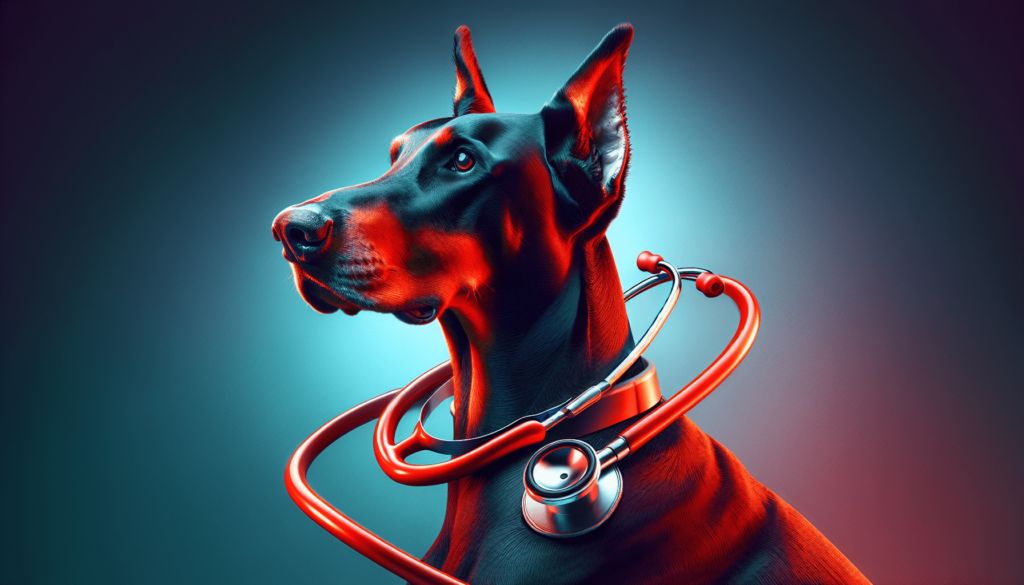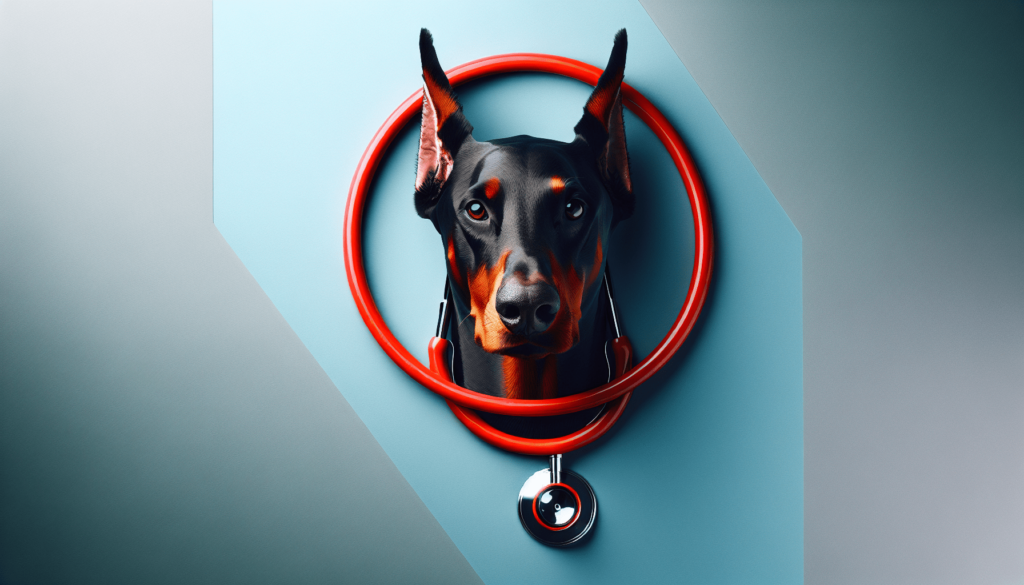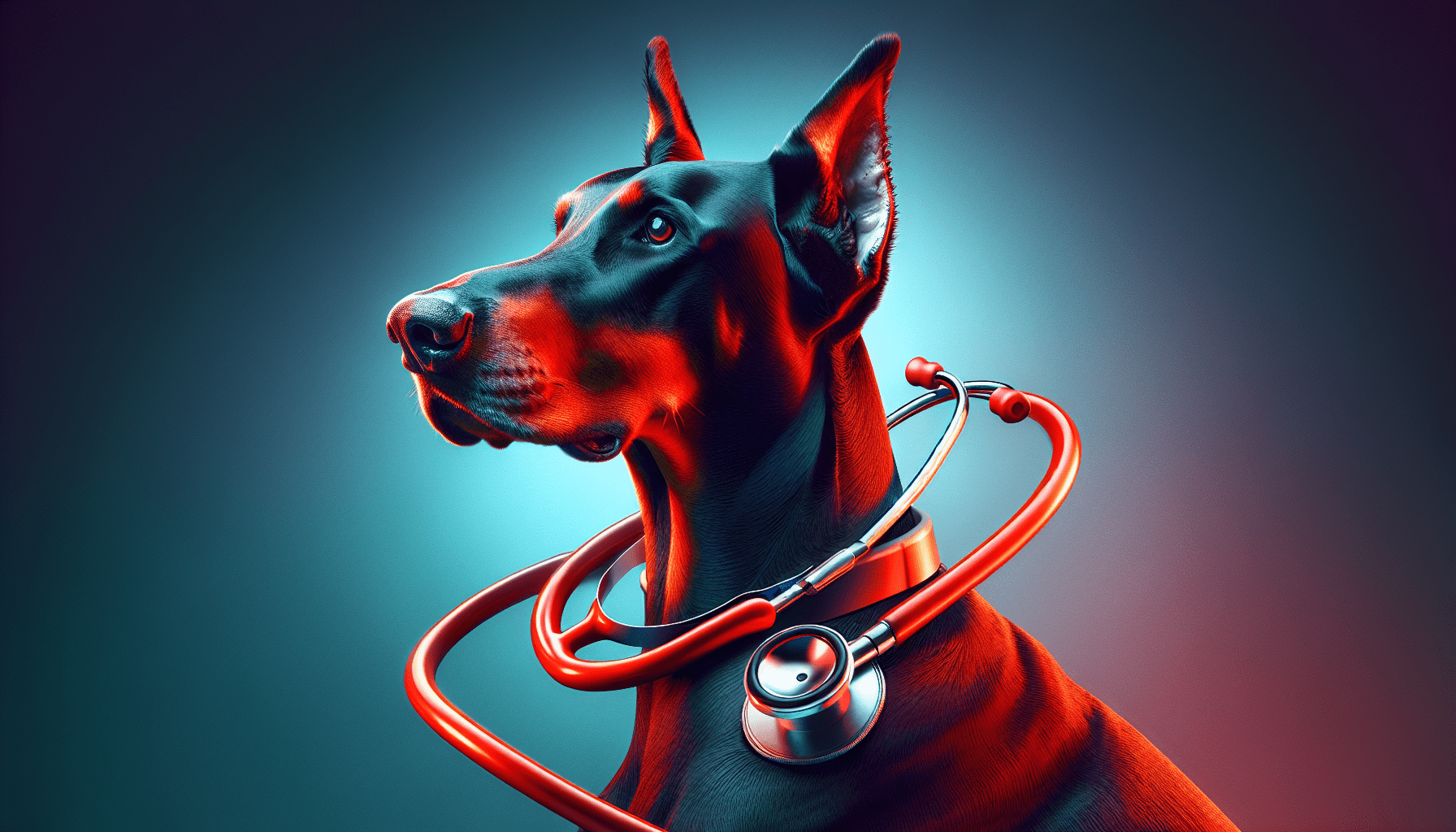When it comes to our beloved Dobermans, it is essential to stay informed about the common health issues that can affect them. From heart problems to hip dysplasia, these loyal companions can face a range of health challenges throughout their lives. By understanding and recognizing these common health issues, you can ensure that your Doberman receives the necessary care and attention to live a happy and healthy life by your side. So, let’s take a closer look at some of the prevalent health concerns that Dobermans may encounter.
Genetic Conditions
Dobermans, like any other dog breed, can be prone to certain genetic conditions. These conditions are inherited through the genes passed down from the parents to the offspring. While not all Dobermans may experience these conditions, it is important for owners to be aware of them and take necessary precautions to ensure the well-being of their furry companions.
Dilated Cardiomyopathy
Dilated Cardiomyopathy (DCM) is a serious heart condition that commonly affects Dobermans. It involves the enlargement of the heart chambers, which leads to the thinning of the heart muscle and weakening of its pumping ability. Signs of DCM may include fatigue, coughing, difficulty breathing, and even sudden collapse. Regular check-ups with a veterinarian and early detection are crucial for managing this condition.
Von Willebrand’s Disease
Von Willebrand’s Disease (VWD) is a bleeding disorder characterized by a deficiency or dysfunction in a specific clotting protein in the blood. Dobermans with VWD may experience prolonged bleeding after injuries or surgeries, nosebleeds, and excessive bleeding during heat cycles or whelping. While there is no cure for VWD, there are treatment options available to help manage the condition and prevent excessive bleeding.
Hip Dysplasia
Hip Dysplasia is a condition where the hip joint does not form properly, leading to a loose and unstable connection between the femur and the hip socket. This can cause pain, lameness, and difficulty in walking or running. While hip dysplasia may have a genetic component, it can also be influenced by environmental factors such as excessive growth rate or obesity. Proper nutrition, exercise, and regular vet check-ups are essential for managing this condition.
Hypothyroidism
Hypothyroidism occurs when the thyroid gland fails to produce enough thyroid hormones, leading to a decrease in metabolic activity. Common signs of hypothyroidism in Dobermans may include weight gain, lethargy, skin problems, and hair loss. This condition can be managed with lifelong medication, and regular blood tests will help monitor thyroid hormone levels.
Wobbler Syndrome
Wobbler Syndrome is a neurological condition characterized by spinal cord compression in the neck area, leading to coordination difficulties and weakness in the hind limbs. Dobermans with Wobbler Syndrome may have a wobbly gait and difficulty in standing or walking. Treatment for Wobbler Syndrome may involve medication, physical therapy, or in severe cases, surgical intervention.
Cancer
Cancer is a concern for many dog breeds, including Dobermans. It is important for owners to be vigilant and watch out for any signs or symptoms that may indicate the presence of cancer. Early detection and treatment can greatly increase the chances of a positive outcome.
Hemangiosarcoma
Hemangiosarcoma is a malignant cancer that arises from the cells lining blood vessels. It commonly affects the spleen, heart, and liver in Dobermans. Symptoms may include weakness, exercise intolerance, pale gums, and abdominal distention. Unfortunately, hemangiosarcoma is often diagnosed in advanced stages, making it challenging to treat. However, early detection through regular vet check-ups can help in managing the disease.
Osteosarcoma
Osteosarcoma is a highly aggressive bone cancer that commonly affects larger dog breeds like Dobermans. It usually occurs in the long bones of the limbs and may manifest as lameness, swelling, or fractures. Treatment options for osteosarcoma may include amputation of the affected limb, chemotherapy, and pain management. Early intervention offers the best chance of successful treatment.
Lymphoma
Lymphoma is a cancer of the lymphatic system and can affect various organs and tissues. Common signs of lymphoma include enlarged lymph nodes, weight loss, decreased appetite, and lethargy. Treatment for lymphoma may involve chemotherapy, radiation therapy, or immunotherapy. The specific treatment plan will depend on the stage and type of lymphoma.
Mast Cell Tumors
Mast Cell Tumors are a type of skin tumor that involves abnormal growth of mast cells, which are a type of immune cell. These tumors can be found on the skin or in internal organs. Signs of mast cell tumors may include skin lumps or masses, itching, redness, and even ulceration. Treatment options for mast cell tumors range from surgical removal to chemotherapy, radiation therapy, or immunotherapy.

Eye Disorders
Just as humans, Dobermans can also experience various eye disorders. Regular eye examinations by a veterinary ophthalmologist are essential for early detection and appropriate management of these conditions.
Progressive Retinal Atrophy
Progressive Retinal Atrophy (PRA) is a degenerative condition that affects the retina, leading to gradual loss of vision. It usually starts with night vision difficulties and progresses to complete blindness. While there is no cure for PRA, supportive measures such as providing a safe environment and minimizing changes in the environment can help affected dogs adapt to their visual impairment.
Cataracts
Cataracts are a common eye condition characterized by the clouding of the lens, leading to impaired vision. They can occur due to genetic factors, age, or trauma. Cataracts may manifest as a whitish or bluish opacity in the pupil. Surgical intervention is often required to remove the cataracts and restore vision in affected dogs.
Von Willebrand’s Disease
As mentioned earlier, Von Willebrand’s Disease can also affect the eyes of Dobermans. In some cases, it can lead to bleeding within the eye or blood vessels in the eye, causing visual disturbances or even vision loss. Prompt treatment and management of VWD are essential for minimizing the impact on eye health.
Heart Conditions
Given their predisposition to certain heart conditions, it is crucial for Doberman owners to pay attention to their heart health. Regular visits to a veterinarian and routine heart screenings are recommended to ensure early detection and appropriate management.
Arrhythmia
Arrhythmia refers to abnormal heart rhythms, including irregular heartbeats or abnormal electrical conduction within the heart. Dobermans with arrhythmia may experience episodes of fainting, weakness, exercise intolerance, or even sudden cardiac arrest. Treatment for arrhythmia can range from medication to implantation of a pacemaker to regulate the heart’s electrical activity.
Pericarditis
Pericarditis is the inflammation of the sac surrounding the heart, known as the pericardium. It can cause chest pain, fluid accumulation, and difficulty breathing in affected Dobermans. The underlying cause of pericarditis will determine the treatment approach, which may include medication, fluid drainage, or even surgery.
Heart Murmurs
Heart murmurs are abnormal heart sounds produced by turbulent blood flow within the heart. While not all heart murmurs indicate a serious underlying condition, it is important to have them evaluated by a veterinarian. Treatment for heart murmurs may depend on the underlying cause and can range from medication to surgical intervention if necessary.

Skin Issues
Dobermans are susceptible to various skin issues, which can have a significant impact on their overall well-being. Regular grooming, appropriate nutrition, and prompt veterinary care are crucial for maintaining their skin health.
Dermatitis
Dermatitis refers to inflammation of the skin, which can be caused by allergies, infections, or irritants. Dobermans with dermatitis may exhibit symptoms such as itching, redness, swelling, and hair loss. Treatment options for dermatitis may include medicated shampoos, topical creams, dietary changes, and, in severe cases, medication.
Acral Lick Dermatitis
Acral Lick Dermatitis, also known as lick granuloma, is a self-inflicted skin lesion caused by excessive licking or chewing of a specific area, usually on the legs or paws. It can result from boredom, stress, allergies, or even underlying pain. Treatment for acral lick dermatitis may involve identifying and addressing the underlying cause, as well as protecting the affected area to prevent further self-trauma.
Alopecia X
Alopecia X, also known as black skin disease or coat funk, is a condition characterized by hair loss and darkening of the skin. The exact cause of Alopecia X is unknown, but hormonal imbalances are thought to play a role. Treatment for Alopecia X can be challenging, and options may include hormone therapy, dietary changes, or cosmetic management to improve the appearance of the affected coat.
Gastrointestinal Problems
Gastrointestinal problems can cause considerable discomfort and distress to Dobermans. Identifying and addressing these issues promptly is essential for their overall health and well-being.
Gastric Dilatation-Volvulus
Gastric Dilatation-Volvulus (GDV), commonly known as bloat, is a life-threatening condition characterized by the rapid distention of the stomach and twisting of the stomach on its axis. It can lead to severe pain, difficulty breathing, and even death if left untreated. Immediate veterinary attention is required if GDV is suspected. Preventive measures such as feeding multiple small meals, avoiding exercise after meals, and using a slow feeder bowl can help reduce the risk.
Colitis
Colitis refers to the inflammation of the large intestine or colon and can cause symptoms such as diarrhea, blood in the stool, and abdominal discomfort. It can be caused by dietary changes, infections, or underlying conditions such as inflammatory bowel disease. Treatment for colitis may involve dietary modifications, medication, and providing a calm and stress-free environment for affected Dobermans.
Pancreatitis
Pancreatitis is the inflammation of the pancreas, which can disrupt the normal digestion and absorption of nutrients. Dobermans with pancreatitis may experience symptoms such as vomiting, abdominal pain, loss of appetite, and lethargy. Treatment usually involves dietary changes, medication, and supportive care to manage pain and restore pancreatic function.
Neurological Disorders
Neurological disorders can affect the nervous system of Dobermans, leading to a wide range of symptoms and impairments. Early recognition of these conditions and appropriate veterinary management can help improve the quality of life for affected dogs.
Hypomyelination
Hypomyelination is a condition where the production of myelin, a protective coating around nerve fibers, is impaired. This can lead to coordination difficulties, muscle weakness, and tremors in affected Dobermans. While no cure for hypomyelination currently exists, supportive care and physical therapy can help manage the symptoms and improve overall function.
Degenerative Myelopathy
Degenerative Myelopathy (DM) is a progressive and irreversible disease that affects the spinal cord of Dobermans, leading to weakness and loss of coordination in the hind limbs. Early signs of DM may include dragging of the paws and difficulty rising from a lying position. While there is currently no cure for DM, physical therapy, mobility aids, and maintaining a healthy weight can help manage the condition and improve the dog’s quality of life.
Cervical Spondylomyelopathy
Cervical Spondylomyelopathy, also known as wobbler syndrome, is a condition characterized by spinal cord compression in the neck area (cervical spine). This can result in a variety of symptoms, including a wobbly gait, weakness, and difficulty in coordinating limb movements. Treatment for wobbler syndrome may involve medication, physical therapy, or in severe cases, surgical intervention to alleviate the compression and stabilize the affected vertebrae.
Joint and Bone Conditions
Joint and bone conditions can cause pain, lameness, and mobility issues in Dobermans. Early diagnosis and proactive management are crucial for maintaining their quality of life.
Wobbler Syndrome
As mentioned earlier, wobbler syndrome can also affect the joints and bones of Dobermans. The compression of the spinal cord in the neck area can lead to weakness and coordination difficulties not only in the hind limbs but also the front limbs. Treatment for wobbler syndrome may involve medication, physical therapy, or surgery, depending on the severity and location of compression.
Elbow Dysplasia
Elbow Dysplasia is a developmental condition affecting the elbow joint, resulting in abnormal growth and poor alignment. It can cause pain, lameness, and reduced range of motion in affected Dobermans. Treatment options for elbow dysplasia may include medication, physical therapy, weight management, and in some cases, surgery to improve joint function and reduce discomfort.
Hypertrophic Osteodystrophy
Hypertrophic Osteodystrophy (HOD) is a bone disease that predominantly affects large and giant breed puppies, including Dobermans. It causes inflammation and swelling of the growth plates in the long bones, leading to pain and lameness. While the exact cause of HOD is unknown, nutritional imbalances and rapid growth are believed to be contributing factors. Treatment typically involves supportive care, pain management, and ensuring appropriate nutrition to support the affected puppy’s growth and development.
Endocrine Disorders
Endocrine disorders involve abnormalities in hormone production and regulation. Dobermans can be prone to certain endocrine disorders, which require lifelong management and monitoring.
Hypothyroidism
As mentioned earlier, hypothyroidism is a condition where the thyroid gland fails to produce enough thyroid hormones. It can lead to a range of symptoms, including weight gain, fatigue, skin problems, and hair loss. Lifelong medication in the form of thyroid hormone replacement is typically required to manage hypothyroidism effectively.
Hypoadrenocorticism
Hypoadrenocorticism, also known as Addison’s disease, occurs when the adrenal glands do not produce enough hormones. This can result in symptoms such as weakness, vomiting, diarrhea, and dehydration. Treatment for hypoadrenocorticism usually involves hormone replacement therapy and close monitoring of electrolyte levels to maintain the dog’s well-being.
Diabetes Mellitus
Diabetes Mellitus is a condition characterized by the body’s inability to properly regulate blood sugar levels due to insufficient insulin production or insulin resistance. Symptoms of diabetes in Dobermans may include increased thirst, increased urination, weight loss, and lethargy. Treatment often involves insulin therapy, dietary management, and regular monitoring of blood glucose levels.
Reproductive Issues
Reproductive issues can arise in intact Dobermans and can have serious health implications. Responsible breeding practices and proper veterinary care are crucial to ensure the well-being of both the dog and potential offspring.
Cryptorchidism
Cryptorchidism is a condition where one or both testicles fail to descend into the scrotum. This can increase the risk of testicular cancer and potentially infertility. Surgical intervention is typically required to remove the retained testicle and prevent potential complications.
Pyometra
Pyometra is a serious infection of the uterus that can occur in intact female dogs. It is a potentially life-threatening condition and can manifest as vaginal discharge, lethargy, and loss of appetite. Immediate veterinary attention is necessary, and treatment often involves emergency spaying to remove the infected uterus.
False Pregnancy
False pregnancy, also known as pseudopregnancy or pseudocyesis, occurs when a non-pregnant female dog exhibits symptoms of pregnancy, such as nesting behavior and mammary gland enlargement. While false pregnancy is a normal physiological response, it can sometimes lead to complications such as mastitis. Most cases do not require treatment and resolve on their own, but close monitoring is recommended.
In conclusion, Dobermans are prone to a variety of health issues, including genetic conditions, cancer, eye disorders, heart conditions, skin issues, gastrointestinal problems, neurological disorders, joint and bone conditions, endocrine disorders, and reproductive issues. Early detection, appropriate veterinary care, and responsible breeding practices are essential for maintaining the health and well-being of these beloved companions. Regular check-ups with a veterinarian, proper nutrition, exercise, and a loving, supportive environment can help ensure that Dobermans lead healthy, happy lives.
